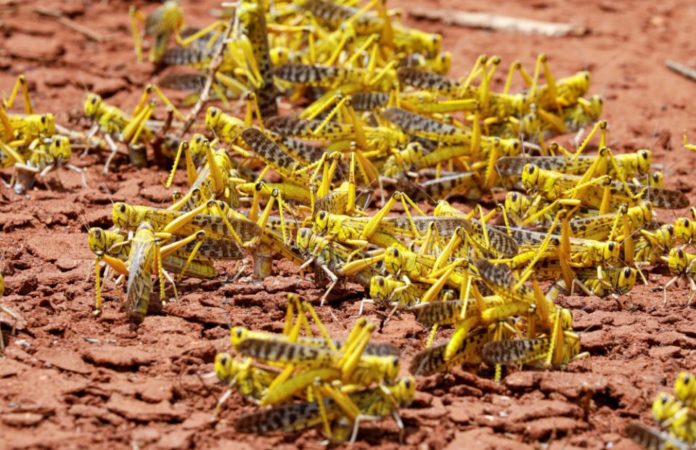DHAKA, June 4, 2020 (BSS) – In the backdrop of locust infestation in most of the African countries and several neighboring Indian states, Country’s noted Agricultural scientists in a review meeting today recommended for formation of a national technical committee in order to tackle the possible invasion of the locust in the country.
Although the locust, a kind of grasshopper pest, in generally found in different desert land and Sub-Saharan Africa where annual rainfall is only 200 to 250 millimeters(mm), but access humidity and more 2000 mm rainfall on in average have created an opportunity of less risk for locust infestation in Bangladesh, said the scientists in the meeting held at Bangladesh Agricultural Research Council (BARC) here.
But the BARC scientists, however, stressed on quick precautionary measures to tackle any possible invasion of the pesticides as the locust outbreak can cause heavy toll for different agricultural crops.
Calling upon the scientists to find out necessary recommendations aiming to take preparations and quick planning on how to face such dangerous catastrophe, Dr Abdur Rauf, additional secretary of the Agriculture Ministry, said “We need to take all the precautionary measures in the quickest possible time so that our crops can be protected from the attack of this ‘destructive pesticides’.”
Referring to the locust outbreak in some Indian states, the official said Bangladesh is not out of risk of such devastating pest attack as our close neighbor India is facing the problem.
With BARC Executive Chairman Dr Sheikh Mohammad Bakhtiar in the chair, the meeting also addressed by additional secretary Kamla Ranjan Das, Food and Agricultural Organization (FAO) under the United Nations representative Dr Nur Ahmed Khandoker and BARC’s Principal Scientific Officer (PSO) Dr Nirmal Kumar Datta.
The scientists also shared the detailed experiences of locust control by different countries in the world and discussed on the availability of necessary pesticides, spray and drone like equipment, chemical and biological control of the locust for preparing a detailed recommendations to this end, said a BARC release.
Locusts are an omnivorous and migratory insect that can fly hundreds of kilometers in swarms and easily cross national boundaries.
Apart from Africa and Asia, it is also found in the Middle East, and inhabits some 60 countries. A swarm one sq. kilometer in size contains about 40 million locusts, which eat the same amount of food in one day as about 35,000 people, according to the FAO.
The flying insects have crossed over to India in a wave of desert swarms from neighboring Pakistan, sweeping several parts of the country and threatening to damage crops.
Among Indian states affected by the desert locusts, one of about a dozen species of short-horned grasshoppers, are northwestern Rajasthan, northern Punjab, western Gujarat and central Madhya Pradesh. Several other states as well as the territory that includes the national capital have also sounded the alarm over a potential attack in their regions.
Indian Prime Minister Narendra Modi noted in a Sunday radio address that many parts of the country have been affected by locust attacks, adding that efforts are on the way to help farmers and reduce crop losses by using modern techniques to tackle the crisis.



